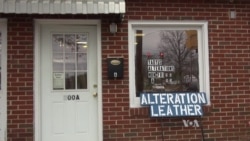When Parvin and Yadollah Jamalreza and their three children came to the U.S. from Iran, they brought two suitcases full of clothes and a pair of 100-year-old scissors. Yadollah had purchased the scissors from another tailor 40 years earlier.
Whatever, their monetary value, the scissors have enormous symbolic value for the Jamalrezas.
“This is very old and dear to us. We brought it from Iran,” said Parvin, who adds, “It is still working well.”
The Jamalrezas’ new life in the U.S. seems to be anchored by old things. They were granted refugee status and came to the U.S. about 11 years ago after staying for a year in Turkey.
Help waiting at airport
“When we came to the United States and the Charlottesville [Virginia] airport,” Parvin said. “We didn’t know what to do. Somebody called our names. We were very excited. ‘Oh, OK, somebody knows us.’”
That somebody was from the International Rescue Committee, the refugee resettlement agency. Barbara — the Jamalrezas say they will never forget her name — took them to a home that had been set up for them.
“That made it easy for us to live here,” Parvin said.
She was able to focus on finding a job, which she quickly did at a shop that did clothing alterations even though she still had no English skills.
“Because this is my thing. I know that,” Parvin said. “I worked in my country actually before I came here for about 25 years; I worked making clothes. That made me happy to find exactly what I have the skill for.”
Old sewing machine
Two years later, the couple opened their own business, Yady’s Alterations, and ever since has provided services to the Charlottesville community that few Americans can provide.
Parvin is good at sewing clothes, and her husband is good with leather. Yadollah prefers to use a 150-year-old antique sewing machine, which he powers with his feet on a treadle rather than electricity.
“We found it on the Internet, eBay. We put the bid and we won, we got that,” Parvin said proudly.
No need to advertise
In the beginning, the Jamalrezas did quite a bit of advertising, but they have long since stopped. Word of mouth works just fine. On a recent day, new customer Getty Goedken was picking up some clothes the Jamalrezas had altered.
“One of my friends who has lived here forever heavily recommended it. So I figured I’d go on his word. He has always had great work done here,” Goedken said. “So, especially with what I picked up today, I am very, very happy.”
The Jamalrezas bought their own house four years ago. All of their children have finished college now and have jobs.
Parvin is still working hard.
“Our business now is really good. I make people happy and people make me happy,” she said.
‘History here’
“I am so safe,” Parvin says as she looks out over her now not-so-new life in Charlottesville.
“People here are very friendly, very kind, and very generous. I never feel I am a refugee.”
There is one other thing she especially likes about Charlottesville. It is an “old town. It has history here.”
By the standards of an ancient civilization like Iran, Charlottesville, founded in 1762, is relatively young. But it was an important place in the early days of the U.S. The home of third President Thomas Jefferson is near here, as are homes of fourth and fifth presidents, James Madison and James Monroe.
All of this has significance for Parvin: “This is very proud here.”





